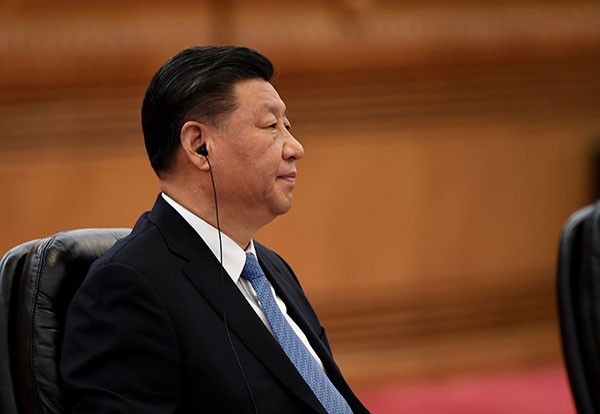Chinese President Xi Jinping issued a high-profile appeal to foreign investors on Friday, hosting over 40 top global business executives in Beijing as the country confronts a deepening economic slowdown and rising geopolitical tensions with the United States. The meeting comes just days ahead of an expected new round of sweeping U.S. tariffs set to be announced by President Donald Trump.
Xi told the group of CEOs that "China has always been, is and will inevitably continue to be an ideal, safe and promising destination for foreign investment," according to a statement from state-run Xinhua News Agency. Executives in attendance included FedEx CEO Raj Subramaniam, Qualcomm chief Cristiano Amon, BMW Chairman Oliver Zipse, Bridgewater Associates founder Ray Dalio, Toyota Chair Akio Toyoda, and Sanofi CEO Paul Hudson.
Reiterating pledges to expand market access and ensure fair treatment for foreign businesses, Xi said that multinational corporations wield "significant international influence" and urged them to "speak up with reason, take pragmatic action, and resist any attempts to turn back the clock on progress."
"Blocking others' paths will ultimately only obstruct your own," Xi warned, in remarks that appeared directed at Washington. "Decoupling and breaking supply chains harm everyone and lead nowhere."
The meeting followed last weekend's China Development Forum, an annual event attended this year by executives from 86 multinational corporations. Premier Li Qiang used the forum to ask global business leaders to "resist protectionism" amid what he described as "growing instability and uncertainty."
On Monday, Apple CEO Tim Cook met with Chinese Commerce Minister Wang Wentao, pledging to increase investment in China's supply chain and social initiatives. Wang criticized unilateral U.S. tariffs and stressed China's willingness to work with Washington on stabilizing the policy environment for businesses.
China's economy remains under pressure, with foreign direct investment (FDI) dropping 20% year-on-year in the first two months of 2025, after a 27.1% annual decline in 2024 to its lowest level since 2016. The government has set an ambitious 5% growth target for this year, despite ongoing weakness in the property market and sluggish consumer spending.
Xi's overture comes amid escalating trade tensions. Since January, the Trump administration has imposed an additional 20% tariff on all Chinese imports, adding to earlier duties on hundreds of billions of dollars in goods. Beijing has responded with tariffs of up to 15% on select U.S. imports and has tightened export controls on certain raw materials.
"Going with China is going with opportunities. Believing in China is believing in tomorrow. Investing in China is investing in the future," Xi said.
The Chinese president also defended the country's openness to foreign enterprise, promising that "the door of opening up will only open wider and wider. The policy of utilizing foreign investment has not changed and will not change."
Xi's charm offensive was widely viewed as a response to the wave of capital flight and corporate retreat from China in recent years, driven by regulatory crackdowns, pandemic disruptions, and rising concerns about political risk. His message to executives doubled down on reversing that trend, positioning China as an indispensable part of the global economy despite a shifting geopolitical landscape.
While he did not mention U.S. tariffs directly, Xi warned against what he characterized as isolationist behavior. "Blowing out other people's lights will not make your own lights brighter," he said.
The White House is expected to announce additional reciprocal tariffs on multiple trading partners early next week, as part of Trump's broader push to protect domestic industry and combat what he has described as unfair foreign trade practices. Despite the mounting tensions, the U.S. president has signaled a willingness to reopen talks with Beijing.






